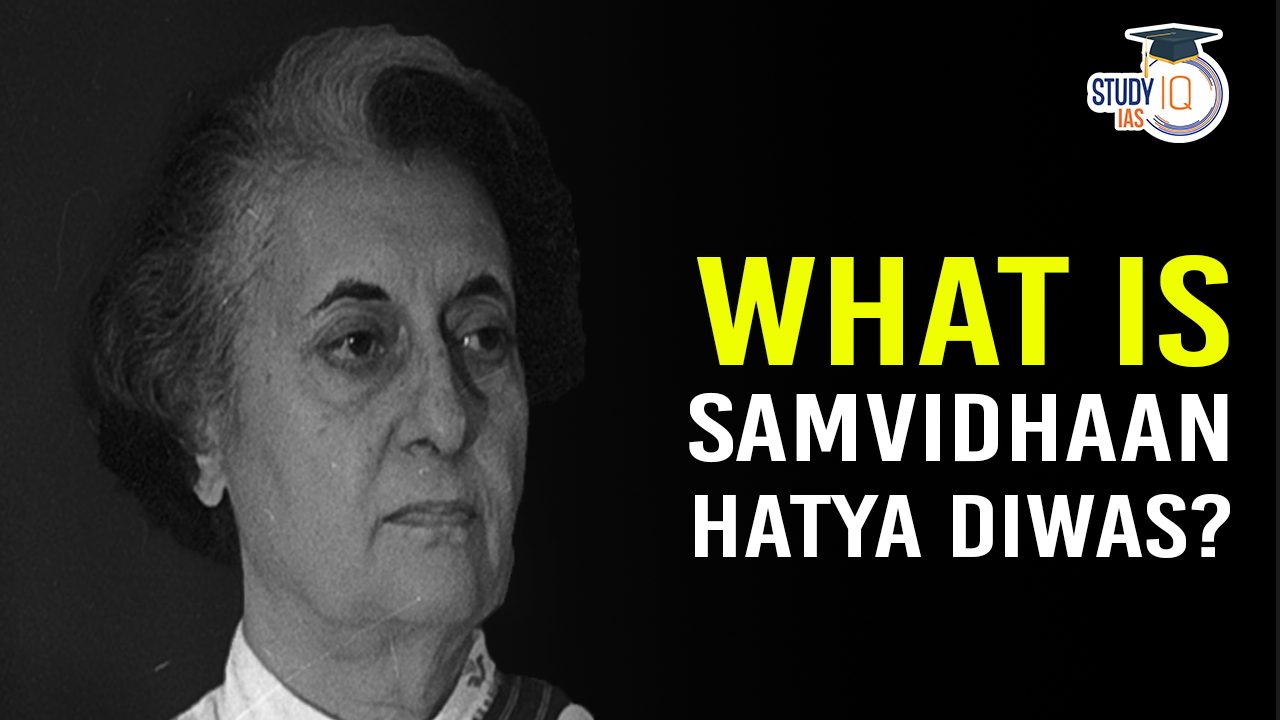Table of Contents
The Government of India has announced a year-long observance of “Constitution Murder Day” from June 25, 2025, to June 25, 2026, to mark the 50th anniversary of the Emergency imposed on June 25, 1975. This initiative aims to commemorate one of the darkest chapters in India’s democratic history, raise awareness among citizens—especially the youth—and reaffirm India’s commitment to constitutional values, democratic ethics, and civil liberties.
June 25 Declared As Samvidhaan Hatya Diwas
June 25 has been officially declared as ‘Samvidhaan Hatya Diwas’ (Constitution Murder Day) in India. This designation commemorates the imposition of the Emergency in 1975 and aims to remember those who suffered during that period of suspended civil liberties and political repression.
What is “Constitution Murder Day”?
“Constitution Murder Day” refers to June 25, 1975, when Emergency was declared across India by then Prime Minister Indira Gandhi under Article 352 of the Constitution. The period of Emergency lasted 21 months, during which civil liberties were suspended, political opposition was crushed, and freedom of speech was curtailed.
As per the notification issued by the Ministry of Home Affairs dated July 11, 2024, this day has been officially designated as “Constitution Murder Day” to commemorate the unprecedented assault on India’s constitutional framework and democratic institutions during the Emergency period.
The Imposition of Emergency
Indira Gandhi’s decision to impose the Emergency came amidst growing political unrest and a challenged government, citing the need to maintain order and stability. However, its implementation saw the suspension of fundamental rights, including freedom of speech and assembly, while dissent was suppressed through widespread arrests. Politicians across party lines, activists, and journalists were among those detained without due process.
Historical Background
- Emergency Declaration: Indira Gandhi declared Emergency, citing internal disturbances and threats to national security.
- Suspension of Rights: Fundamental rights such as freedom of speech, assembly, and movement were suspended.
- Media Suppression: Censorship was imposed, leading to the suppression of dissenting voices and critical journalism.
- Political Detentions: Opposition leaders, activists, and journalists were arrested without due process.
Why is the Emergency Period Called a Dark Chapter?
The Emergency (1975–1977) is considered a black chapter in Indian history due to the following reasons:
-
Suspension of Fundamental Rights
Citizens lost their right to legal remedy under Article 226 and 32, including habeas corpus. -
Mass Censorship
The press was heavily censored, and publications critical of the government were banned. -
Widespread Political Arrests
Opposition leaders, activists, journalists, and dissenters were jailed without trial under MISA (Maintenance of Internal Security Act). -
Forced Sterilizations
A controversial population control programme led to the sterilization of lakhs of men, often coercively. -
Centralization of Power
Power was concentrated in the hands of a few individuals, bypassing institutional checks and balances.
Impact on Indian Democracy
- Erosion of Democratic Norms: The Emergency period saw a significant curtailment of democratic freedoms and institutional checks.
- Authoritarian Rule: Centralization of power in the hands of the Prime Minister, sidelining democratic institutions.
- Legacy of Fear: Created a climate of fear and intimidation among political opponents and citizens.
Commemoration as ‘Samvidhaan Hatya Diwas’
- Government Recognition: Designated by the Indian government to remember the sacrifices and hardships endured during the Emergency.
- Symbolic Importance: Reminds citizens of the importance of upholding constitutional values and safeguarding democratic principles.
- Contemporary Reflections: Prompts debates on governance, civil liberties, and the role of the judiciary in protecting constitutional rights.
Political and Social Responses
- Diverse Reactions: Varied responses from political parties and civil society regarding the significance and legacy of the Emergency.
- Historical Revisionism: Criticisms and defenses of the government’s decision to commemorate the day.
- Educational Initiatives: Importance of teaching the Emergency period in schools to educate future generations about threats to democracy.
Political Reactions and Contemporary Significance
The decision has sparked varied reactions from different political quarters. While supporters argue it underscores the need to remember past injustices and uphold constitutional principles, critics accuse the ruling party of political opportunism and selective historical remembrance. The debate surrounding the legacy of the Emergency continues to resonate in contemporary Indian politics, influencing discourse on governance, civil liberties, and democratic norms.
As India marks ‘Samvidhaan Hatya Diwas‘, it underscores the nation’s commitment to learn from its past and reaffirm its dedication to democracy. The event serves as a poignant reminder of the resilience of India’s democratic institutions and the enduring struggle to uphold constitutional values in the face of adversity. It calls upon citizens and leaders alike to safeguard the freedoms enshrined in the Constitution and remain vigilant against any threat to democratic principles.


 Payments Regulatory Board (PRB)
Payments Regulatory Board (PRB)
 White-Bellied Heron: Habitat, Conservati...
White-Bellied Heron: Habitat, Conservati...
 Salal Reservoir: Location, River, Capaci...
Salal Reservoir: Location, River, Capaci...

























